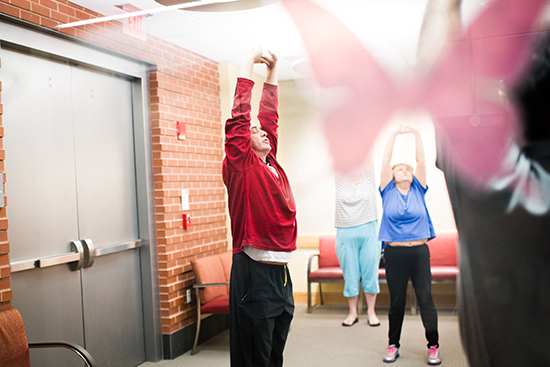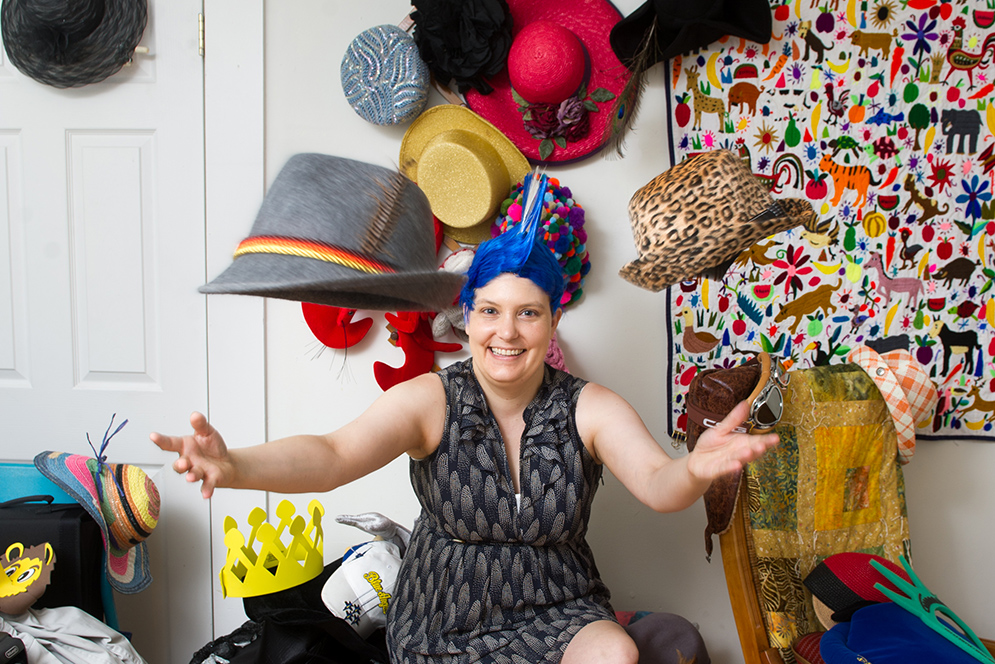When 32-year-old Caroline Moore-Kochlacs was diagnosed with breast cancer in January 2015, she remembers thinking, OK, this sucks, but it’s something that you get through.
But a scan soon discovered the cancer had metastasized to her liver and bones. Further tests found that she carried the BRCA-2 gene, which sharply increases the risk of developing breast cancer.
“I definitely became anxious and depressed for several weeks,” says Moore-Kochlacs (GRS’16), a PhD student studying neuroscience at the time. “I went on an antidepressant and slowly had to readjust to the reality. I’m a scientist, so I would look up research studies, and my mood would entirely depend on what I found. I spent a lot of time wondering about whether what I was reading would work for me or not.”
Eventually Moore-Kochlacs pulled herself out of her depression by packing her schedule with activities and spending more time with family and friends. She also found solace in Boston Medical Center’s Cancer Support Services Program, which provides patients and their families with assistance outside of the medical purview, like cancer support groups, yoga, massage, and patient navigators, who provide advocacy and case management for patients, helping them coordinate complex treatment schedules, arrange transportation, deal with insurance, and more.
“I really wanted to give back because Boston Medical Center is the safety net hospital in the area,” says Moore-Kochlacs, whose parents are pastors and who herself is passionate about social justice issues. “When I first said, ‘OK, how do I give back?’ my integrated therapy doctor told me to put my own oxygen mask on first, so to speak.”
This May, she came up with an idea: photographing herself wearing 100 hats over 100 days (cancer treatment has caused her to lose most of her hair) and posting the photos to Facebook and to a blog she started called Hat On It to encourage people to donate to BMC. She has raised more than $20,000. In retrospect, she says, starting to write the daily posts while she was also scrambling to complete her dissertation on computational neuroscience, which she worked on in conjunction with MIT’s Synthetic Neurobiology Group, was poorly thought out. But her lab coworkers and her advisor, Nancy Kopell, a William Fairfield Warren Distinguished Professor and a College of Arts & Sciences professor of mathematics, have been incredibly helpful and supportive, she says.

Ramel Rones teaches a tai chi class for patients at Boston Medical Center’s Cancer Support Services Program. Photo by Jackie Ricciardi
Over the past three months, Moore-Kochlacs has posted photos of herself wearing all kinds of hats, many of them humorous, ranging from a foam Michigan cheese hat to a Mickey Mouse Sorcerer’s Apprentice hat, and several vintage hats. Most have been sent to her by family and friends.
She writes unsparingly about what it’s like to be going through cancer treatment, her blog entries often brutally honest. On Day 11, she posed wearing a funny parrot hat, but wrote about how a six-hour chemotherapy treatment had left her fatigued and nauseous. Medical marijuana, she says, has given her huge relief from her symptoms, which can mean the difference between being able to leave the house or not being able to. On other days, she’s posted about visits from friends and family, or her progress on her dissertation. On Day 67, she wrote about life expectancy rates for someone with metastatic breast cancer.
“The other day I was feeling bad about how last minute my dissertation is coming together, regretting that I haven’t had a committee meeting to get feedback, thinking about all I want to convey in my dissertation, how unlikely I am to convey it all,” she wrote. “I expressed this all to my mom on the phone and she said, ‘You know, a year and a half ago, we didn’t know if you’d even be able to defend.’ A year and a half ago, when I was diagnosed, I looked up the median survival numbers for metastatic breast cancer patients. The doctors tell you not to look up the numbers because every patient is different….But what was I going to do, not look up the numbers? The median survival for metastatic breast cancer patients is about two years after diagnosis.”
Now in her 7th month of chemotherapy treatment and 17th month of living with cancer, Moore-Kochlacs says she feels like she can start saying yes to future plans. “Next year, I want to do a trip to Europe with friends,” she says. “I’m saying we’re doing it because it’s not worth not saying it.”
On July 26, she successfully defended her dissertation, titled “Extracellular Electrophysiology with Closed-Packed Recording Sites: Spike Sorting and Characterization.” Translated for the layperson: she studied how to more efficiently record lots of neurons. Over the next few months she will finish working on the project as a postdoc at MIT.
Since her cancer diagnosis, Moore-Kochlacs says, friends have commented that she seems less stressed. She acknowledges that it’s changed her perspective. “There’s a mode I can go to where I say, this is not the end of the world,” she says. “It’s a little cliché, but don’t sweat the small stuff. It’s either going to be OK or not be OK, but it’s going to be. I’m someone who always wants to have control, and this disease has forced me to deal with that. My horizon is not superlong, which is frustrating, but I can’t control that. It’s decreased the internal stress monologue about these things that I cannot control.”
Donate to Moore-Kochlacs’ Hat On It campaign here.















































Related Stories
Patient Navigators Improve Delivery of Care for Breast Cancer Patients
BMC program reduces cancer disparities by addressing barriers to timely care
What Are You Wearing This Spring?
Student magazine spotlights fashion, gives a taste of the business
Wearable Windows into Breast Tumors
ENG’s Darren Roblyer is developing technology to help doctors choose best therapies
Post Your Comment